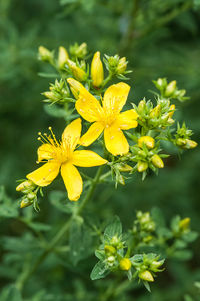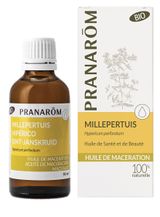St. John's wort
St. John’s wort (Hypericum perforatum) is one of the most commonly used herbs in the United States. It is a shrubby perennial plant with bright yellow flowers. St. John's wort was named because the flowers were said to bloom for the first time around June 24, the birthday of St. John the Baptist. The word "wort" means "plant" in Old English.
See also : Hypericum Perforatum (Homeopathy)
Contents
Special Precautions of St. John's wort
- In published studies, the most common side effects associated with short-term use of St. John’s wort supplements have included mild stomach upset; allergic skin reactions; tiredness; restlessness; anxiety; sexual/erectile dysfunction; dizziness; dry mouth and headache. If applied to the skin, St. John’s wort may cause a skin rash. St. John’s wort (both oral or topical) increases the sensitivity of skin and eyes to sunlight.
- Rarely, St. John’s wort has been associated with serotonin syndrome, a potentially dangerous condition resulting from an excess of serotonin in the central nervous system. Symptoms include confusion, fever, hallucinations, nausea, loss of muscle coordination, sweating, and shakiness. Use with antidepressants, particularly SSRIs, has been associated with this. If you experience any of these symptoms, stop taking St. John’s wort and seek immediate medical attention.
- St. John’s wort may worsen symptoms in people with Alzheimer’s disease, bipolar disorder, schizophrenia or other mental conditions; it may also lead to psychosis or mania.
- People with diagnosed or suspected depression should consult a doctor to ensure that their condition is properly assessed and treated.
- Pregnant or breastfeeding women, and those trying to conceive, should avoid St. John's wort.
- St. John’s wort should not be taken by organ transplant recipients, as it may cause organ rejection.
- In one small study, St. John’s wort was associated with elevated thyroid stimulating hormone (TSH) levels.
- DRUG INTERACTIONS : One of the major downsides of using St. John’s wort is that it may interact in a potentially harmful way with many common medications. It's broken down in the liver by enzymes that also process certain medications. The result is that it can decrease the effectiveness of other medications a person is taking or increase the effect, leading to an increased risk of adverse effects. Avoid taking the following with St. John's wort:
- Alcohol
- Allergy drugs, such as Allegra (fexofenadine)
- Antibiotics, such as Cipro (ciprofloxacin) and Achromycin (tetracycline)
- Antidepressants - St. John’s wort may increase the side effects of certain antidepressants, including Marplan (isocarboxazid), Nardil (phenelzine) and Parnate (tranylcypromine) and other monoamine oxidase inhibitors; Prozac (fluoxetine), Paxil (paroxetine) Zoloft (sertraline) and other selective serotonin reuptake inhibitors (SSRIs); and tricyclic antidepressants, such as Elavil (amitriptyline) and Pamelor (nortriptyline).
- Antifungal drugs, such as Sporanox (itraconazole) and Nizoral (ketoconazole)
- Certain calcium channel blockers, such as Tiazac (diltiazem) and Adalat (nifedipine)
- Cancer medications, such as Camptosar (irinotecan), Gleevec (imatinib), Taxol (paclitaxel), Velbe (vinblastine), and Oncovin (vincristine)
- Cholesterol-lowering statin drugs, such as Mevacor (lovastatin), Lipitor (atorvastatin), and Zocor (simvastatin)
- Dextromethorphan (DM), an ingredient in many non-prescription cough and cold products to relieve cough. Use with St. John's wort may increase serotonin levels, resulting in a greater risk of adverse effects.
- Drugs that suppress the immune system, such as Imuran (azathioprine), CellCept, Neoral (cyclosporine), Prograf (tacrolimus), Rapamune (sirolimus), Zenapak (daclizumab)
- Digoxin – St. John’s wort may reduce its effectiveness
- Iron – St. John’s wort blocks the absorption of iron
- Imodium (loperamide) – A case report of deliurium developing in an otherwise healthy woman taking St. John’s wort and the antidiarrhea medication loperamide.
- Serzone (nefazodone)
- Non-nucleoside reverse transcriptase inhibitors, such as Rescriptor (delavirdine) and Viramune (nevirapine)
- Oral contraceptives – St. John’s wort has been known to cause breakthrough bleeding and may decrease the effectiveness of birth control pills.
- Protease inhibitors such as Crixivan (indinavir), Norvir (ritonavir), Viracept (nelfinavir)
- Psoralen medications, such as methoxsalen or Oxsoralen (8-MOP)
- Reserpine – St. John’s wort blocks the effect of this drug
- Sedative drugs – when used together with St. John’s wort, the sedative effect may be exaggerated
- Sedative herbs, such as catnip, hops, kava and valerian
- Aerolate, T-Phyl, and Uniphyl (theophylline) – St. John’s wort may reduce the effectiveness of theophylline, a medication used for asthma, emphysema and chronic bronchitis
- Triptans such as Imitrex and Amerge (sumatriptan), Axert (almotriptan), Frova (frovatriptan), and Zolmig (zolmitriptan)
- Coumadin (warfarin) – St. John’s wort may reduce the effectiveness of warfarin, increasing the risk of blood clots. St. John’s wort may possibly influence the effectiveness of other anticlotting drugs or similar drugs known as antiplatelet drugs.
The benefits of St. John's wort are
St. John’s wort has long been used as a folk remedy for emotional disorders. It was once thought to rid the body of evil spirits. St. John’s wort has also been used for wound healing and for a variety of other conditions.
There is debate about the active ingredient in St. John's wort. St. John's wort extracts are often standardized to hypericin, which led to the widespread belief that hypericin is the sole active compound. Another constituent called hyperforin has also been found to have antidepressant effects. A growing number of experts consider hyperforin to be the primary antidepressant compound. Recent research suggests other plant components called flavonoids and tannins may also have a medicinal effect. More research is needed.
St. John’s wort can be found in a variety of forms, including capsule, tablet, liquid extract, dry herb and tea. Oil and oil-based ointments and lotions can also available. Products are typically standardized to contain 0.3% hypericin or 2 to 5% hyperforin.
St. John's wort is best known as a natural remedy for mild to moderate depression, but it is also being studied for fear, insomnia, anorexia, anxiety or feelings of worthlessness.
- Depression : Numerous studies in Europe, and more recently in the United States, have found that St. John’s wort is more effective than a placebo and as effective as tricyclic antidepressants for the short-term treatment (1 to 3 months) of mild to moderate depression. It appears to cause fewer side effects than many antidepressants, which is one of the main reasons it has become so popular.At least two recent studies, however, didn’t find St. John’s wort to be more effective than a placebo for major depression. Some experts consider the studies to be flawed, due to inadequate dosages and an insufficient number of participants, which led to unusual results. For example, in one of the studies, the prescription antidepressant sertraline (Zoloft) had no effect on major depression. Another study found that St. John's wort was more effective than fluoxetine (Prozac) but not a placebo. The evidence for St. John's wort for major depression remains unclear. Until we have evidence that it works for severe depression, it should not be used as a substitute for proven treatments.A study involving 150 people with minor depression or dysthymia found that St. John's wort was effective for minor depression (Hamilton Depression Scale score of up to 17), but that it wasn’t effective for people with dysthymia.
- Anxiety : St. John's wort is also being studied for anxiety because, in some studies on depression, people taking St. John's wort also reported an improvement in anxiety. More research is needed.
- Obsessive Compulsive Disorder (OCD) : St. John’s wort has also been suggested as a possible treatment for OCD because the same medications (antidepressants) are often used for OCD, and because of promising results from a preliminary study. A later study on St. John's wort, however, didn’t find it more effective than a placebo for OCD.
- Skin Conditions : Oil of St. John's wort, applied to the skin, was a folk remedy for skin injuries, nerve pain, burns and hemorrhoids. Although the oil is sold in some herbal stores, creams are also available. Some are standardized to hypericin or hyperforin, which are thought to have anti-inflammatory and antibacterial effects. St. John's wort also contains tannins, naturally occurring compounds thought to relieve skin irritations, such as those resulting from minor cuts.
- anti-bacterial : Hypericum perforatum extracts are found to be antimicrobially effective against gram-positive bacteria with special activity towards methicillin-restistant strains of Staphylococcus aureus
- Cancer : Research in the online medical journal PLoS One, found that an active ingredient known as hypericin was highly effective against the invasive cancer melanoma.
- Ear Pain : Some alternative practitioners recommend St. John's wort for ear pain due to an ear infection (otitis media). In a study of more than 100 children, a combination herbal ear drop that contained St. John's wort, garlic, calendula and mullein was found to be as effective as conventional ear drops.
- Smoking Cessation : St. John's wort is being explored for smoking cessation. Although promising, well-designed studies are needed.
- Other Conditions : St. John's wort has also been explored for conditions that can have psychological symptoms, such as insomnia, menopausal symptoms, premenstrual syndrome, seasonal affective disorder and attention deficit disorder. Further studies are needed before recommendations can be made.

